The Economy: A Guide for Advocates
This Navigator Research report contains data on the latest perceptions on the state of the economy, including which political party Americans trust to handle the issues of taxes, growing the middle class, and inflation, as well as the details Americans find most concerning regarding the proposed Republican tax plan.
Four in five Americans support raising taxes on the rich and big corporations.
Four in five Americans prefer raising taxes on the rich and big corporations in order to reduce the deficit over cutting Social Security and Medicare. By a 75-point margin, Americans prefer to reduce the national deficit by raising taxes on wealthy corporations and the rich, including closing tax loopholes, rather than cutting programs like Social Security and Medicare (82 percent raising taxes – 7 percent cutting programs). Americans are overwhelmingly supportive of this preference across party lines, including nine in ten Democrats (92 percent) and more than seven in ten Republicans (74 percent) and independents (72 percent). Even among those in households earning more than $100,000 a year, 77 percent would prefer raising taxes on the wealthy and corporations compared to just 10 percent who would prefer to cut programs like Social Security and Medicare.
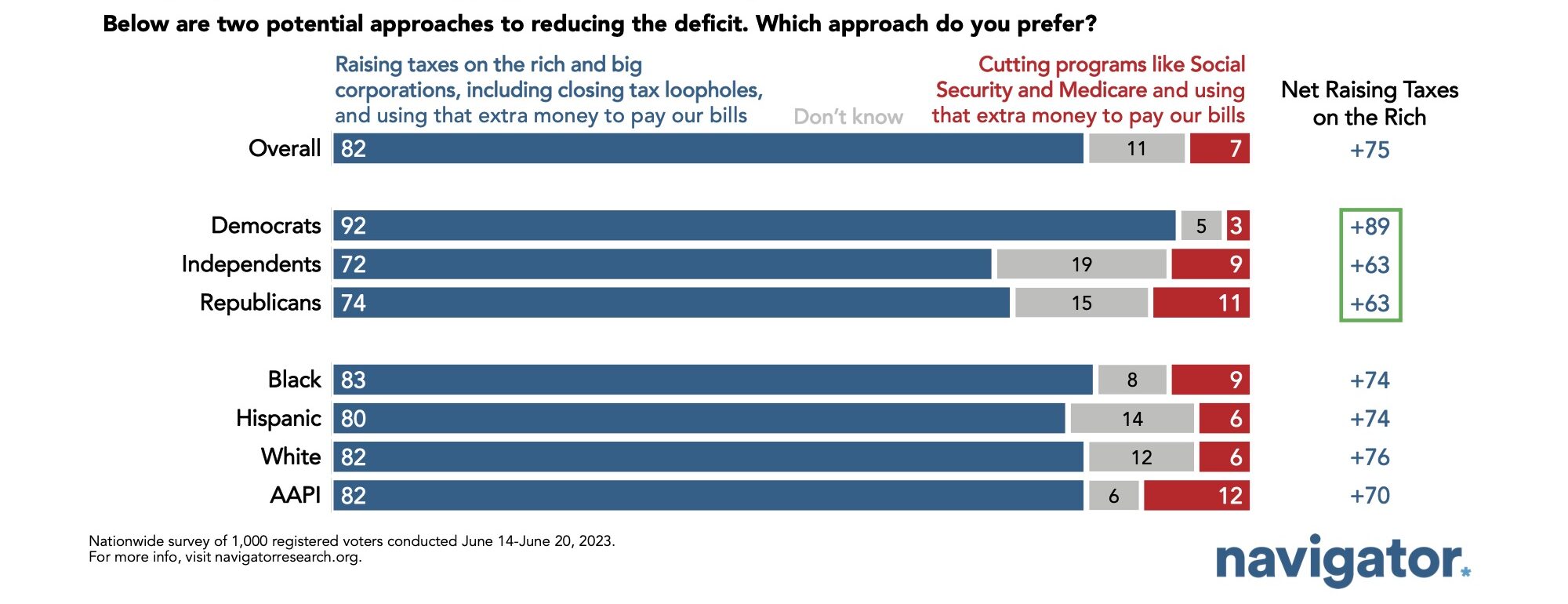
A majority of Americans find Congressional Republicans’ tax plan concerning.
An overwhelming majority of Americans find details of Congressional Republicans’ tax plan concerning, including cuts to Medicaid, reduced funding from K-12 education and food stamps, and cutting help for working families, and these concerns are heightened when juxtaposed alongside tax breaks for corporations and the wealthy. Three in four Americans find it concerning that “Republicans in Congress’ plan would cut Medicaid – the health insurance that kids with disabilities and seniors in nursing homes rely on, but will protect tax breaks for health insurance and drug companies” (74 percent concerning, including 58 percent who find this “very” concerning) and that “[tax plan] would take away funding from K-12 public education and food stamps that people count on, while also letting some rich people and the biggest corporations continue to pay nothing in taxes” (73 percent concerning, including 55 percent who find this “very” concerning). These statements that also noted tax breaks for the wealthy and corporations performed better than versions that only focused on cuts to programs (71 percent concerning and 69 percent concerning, respectively). Other details Americans find to be most concerning include:
- Republicans in Congress’ plan will reduce the debt by cutting help for working families, not by increasing taxes on rich and big corporations. It will make drastic cuts to programs families depend on to afford the basics (71 percent concerning, including 52 percent who find this “very” concerning); and,
- Republicans in Congress’ plan would cut investments in clean energy like solar and wind power but give more tax breaks to the big oil companies that are already making record profits (64 percent concerning, including 45 percent who find this “very” concerning).
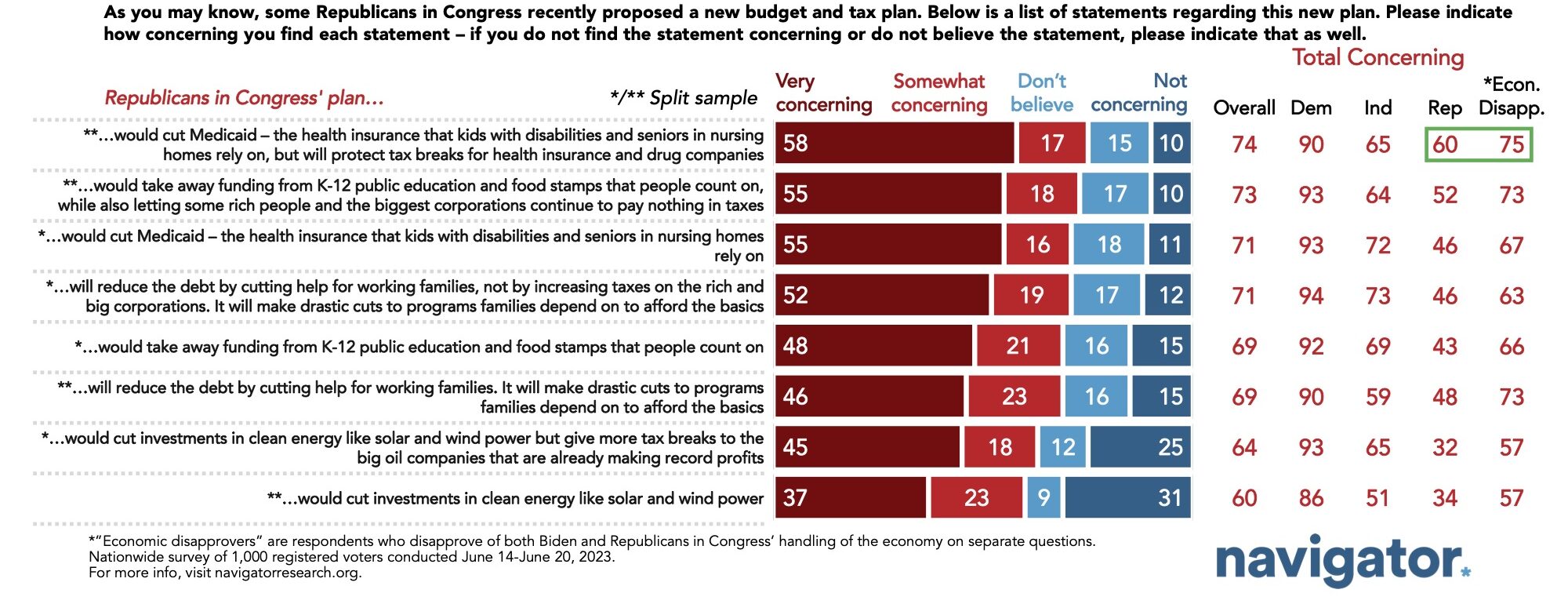
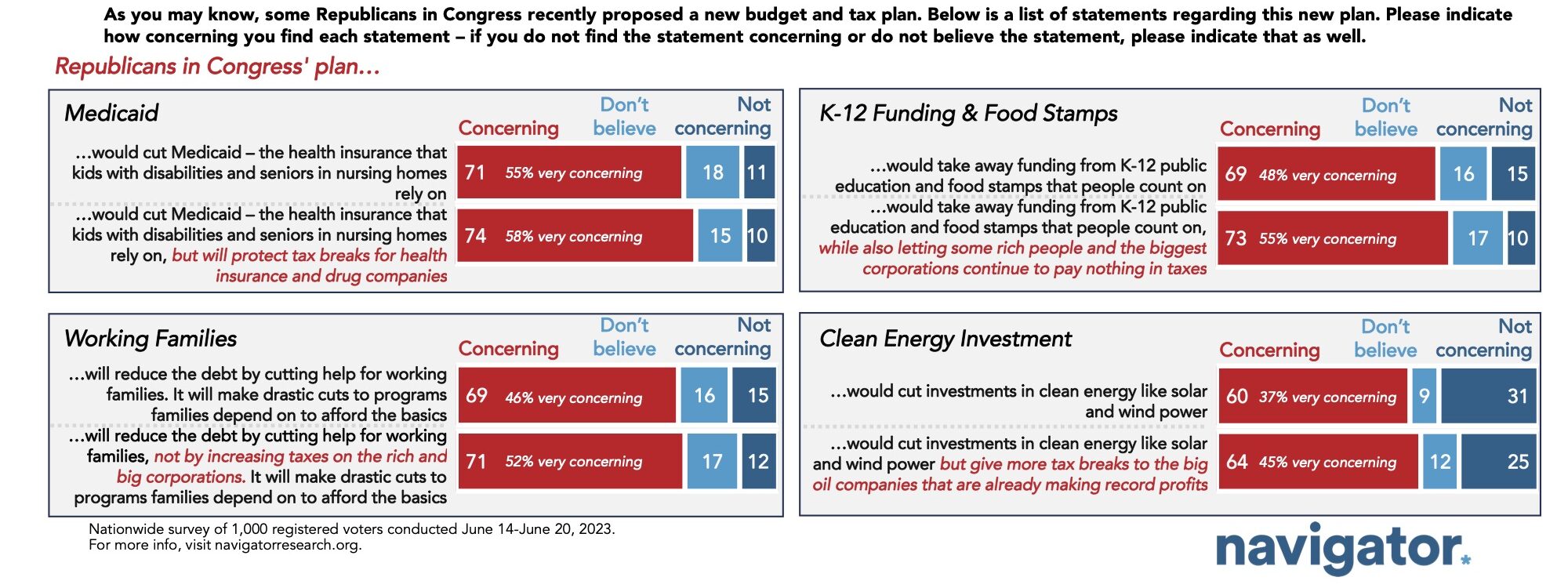
Americans trust Biden and Democrats more than Republicans on protecting benefits.
More Americans trust Democrats more than Republicans to determine tax rates and protect programs like Social Security, Medicare and Medicaid, while a greater share trust Republicans on the issues of inflation and jobs. More Americans trust the Democratic Party over Republicans to determine what tax rates must be paid by multi-millionaires (net +14; 48 percent Biden/Democrats – 34 percent Republicans), to protect Social Security, Medicare, and Medicaid (net +11; 48 percent Biden/Democrats – 37 percent Republicans), and to determine tax rates for the middle class (net +6; 45 percent Biden/Democrats – 39 percent Republicans). The public is more split on which party they trust more to grow the middle class (net +2; 43 percent Biden/Democrats – 41 percent Republicans); Biden and Democrats have stronger trust advantages on growing the middle class among independents (Biden and Democrats +13), college educated women (Biden and Democrats +12), those living in presidential battleground states (Biden and Democrats +11), and those living in households making less than $50,000 a year (Biden and Democrats +8).
- Overall, more Americans trust the Republican Party to handle inflation (net -11; 37 percent Biden/Democrats – 48 percent Republicans) and to strengthen the economy (net -9; 39 percent Biden/Democrats – 48 percent Republicans). Trust in Republicans to handle inflation is driven by Americans living in rural areas (net +25) and non-college educated men (net +24).
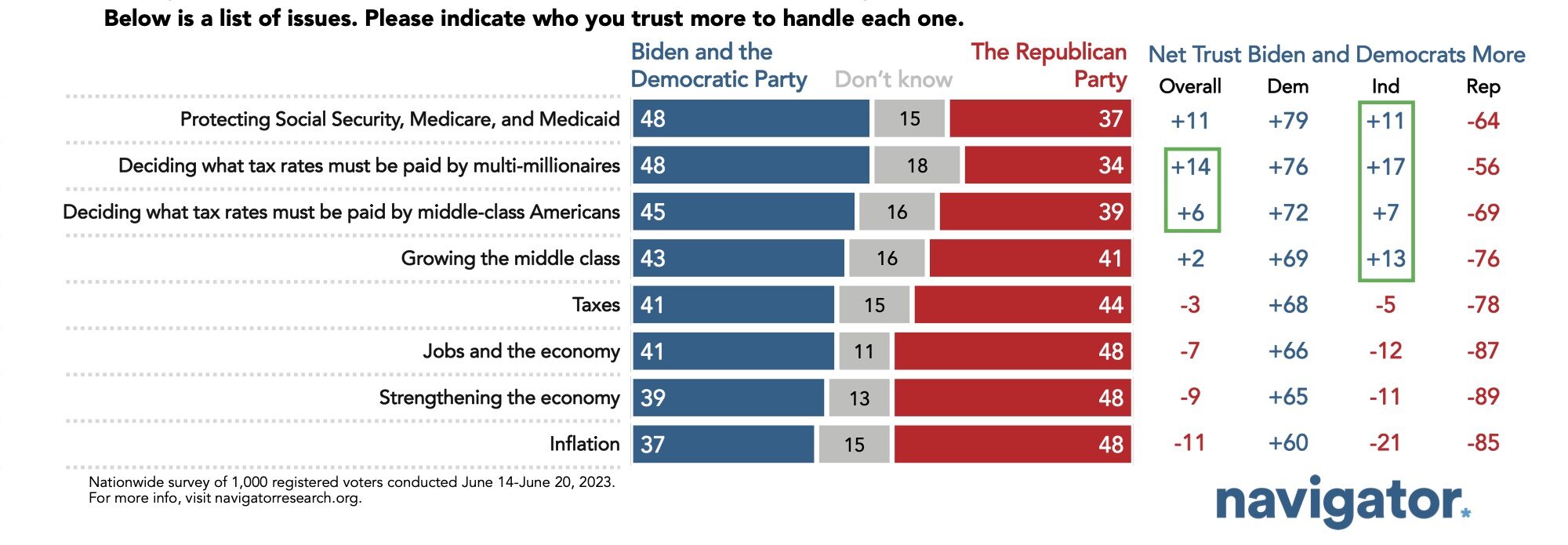
While Biden’s handling of the economy is viewed negatively, Republicans in Congress are viewed even more negatively on the issue.
Three in four Americans continue to view the economy negatively, as both Biden and Congressional Republicans are underwater in their handling of the economy. 74 percent of Americans rate the economy as “poor” or “not so good,” as three in five feel uneasy regarding their personal finances (60 percent). Uneasiness about personal finances is concentrated among service industry workers (72 percent uneasy) and Americans living in households earning less than $50,000 per year (68 percent uneasy).
- Both President Biden (net -21; 38 percent approve – 59 percent disapprove) and Republicans in Congress (net -25; 34 percent approve – 59 percent disapprove) are underwater in their handling of the economy. Congressional Republicans are further underwater than Biden among independents (net -55 compared to net -48) and service industry workers (net -44 compared to net -8).
- The share of Americans who feel they are paying more gas compared to a few weeks ago has decreased six points since early April (from 72 percent paying more to 66 percent). 82 percent of Americans feel they are paying more for groceries compared to a few weeks ago; however, the share saying that they are paying “a lot” more for groceries has declined by 7 points since late March (from 42 percent then to 35 percent now).
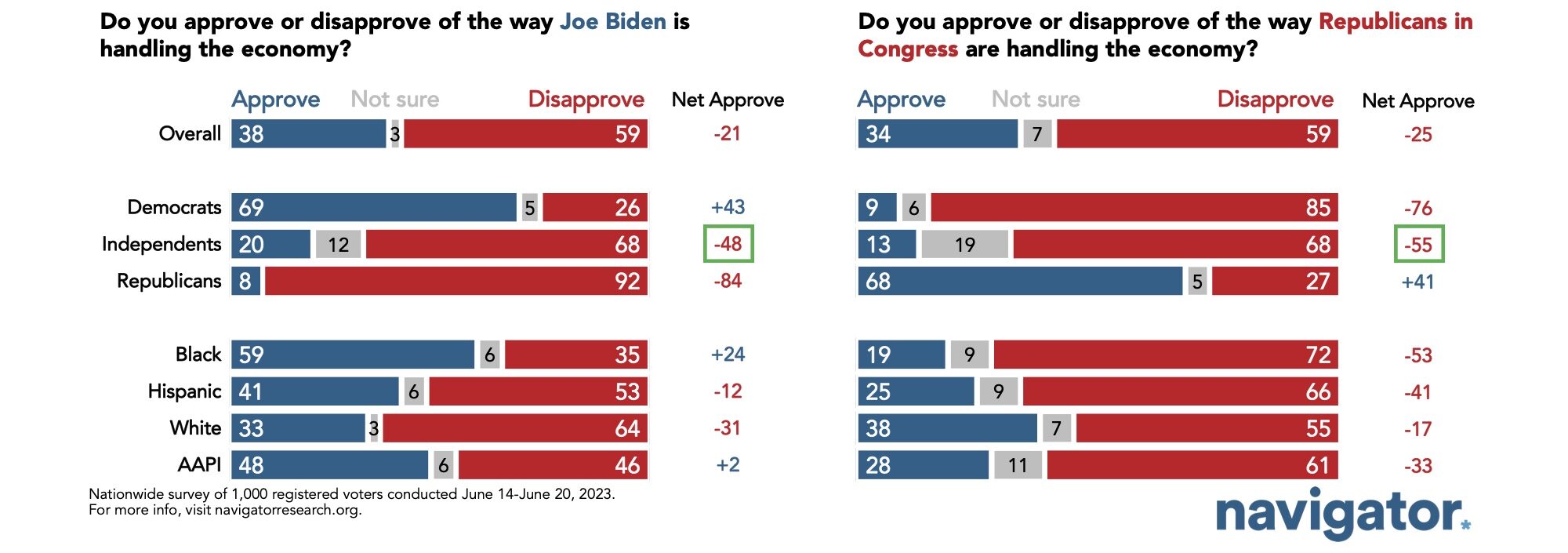
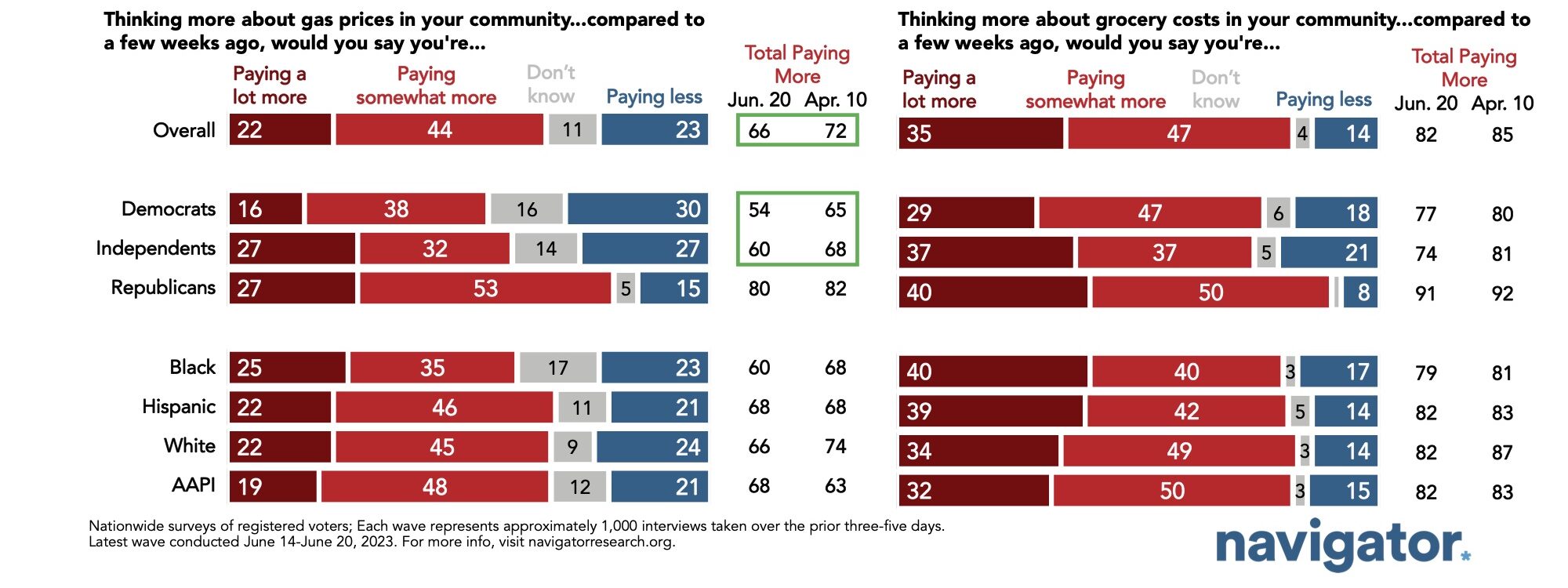
About The Study
Global Strategy Group conducted public opinion surveys among a sample of 1,000 registered voters from June 14-June 20, 2023. 101 additional interviews were conducted among Hispanic voters. 75 additional interviews were conducted among Asian American and Pacific Islander voters. 100 additional interviews were conducted among African American voters. 100 additional interviews were conducted among independent voters. The survey was conducted online, recruiting respondents from an opt-in online panel vendor. Respondents were verified against a voter file and special care was taken to ensure the demographic composition of our sample matched that of the national registered voter population across a variety of demographic variables.




